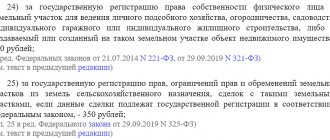Acquisitive prescription for a land plot is regulated by Article 234 of the Civil Code of the Russian Federation (CC). It allows the bona fide owner to become the legal owner of the relevant plot. To register ownership of land, a subject - an individual or an organization - must actually possess it for a fifteen-year period. However, not all such copyright holders have such an opportunity. It is necessary to find out what acquisitive prescription means and how to use it to obtain legal ownership of a plot of land.
What it is?
Dear readers! The article talks about typical ways to resolve legal issues, but each case is individual. If you want to find out how to solve your particular problem , contact a consultant:
+7 (499) 938-81-90 (Moscow)
+7 (812) 467-32-77 (Saint Petersburg)
8 (800) 301-79-36 (Regions)
APPLICATIONS AND CALLS ARE ACCEPTED 24/7 and 7 days a week.
It's fast and FREE !
Acquisitive prescription for a land plot is a method of obtaining the right to land when a citizen first uses the land for a long time, and then can register it as ownership.
In order to obtain a plot, you need to do the following:
- receive land from the state or municipality on the right of use;
- continuously own the land plot for 15 years;
- to use as your own in all respects;
- use it clearly for everyone;
- pay your fees conscientiously and take care of them as if they were your own.
If all these signs are present, then the owner has the right to protect his site from third parties. The fact that he uses the land is first an advantage for acquiring ownership of it, and then a right. This does not apply to cases where third parties are owners or have other grounds.
According to the law, the 15-year period of ownership of real estate includes the time of both the person who received the right of ownership from the state and his successor. For example, in the Soviet era, all land belonged to the state, and citizens were allocated plots for lifelong use with the right of inheritance.
If the citizen who received the allotment owned it for 10 years, and then his heir owned it for 5 years, then the result is 15 years. This is exactly the period required for the method of acquiring real estate ownership.
When can it act?
It is not always possible to register an old plot based on this right; there are certain conditions for the validity of such a concept.
- You can register ownership only of a plot that the owner has been using for more than 15 years after acquisition or allocation. Here we should also take into account such a concept as the statute of limitations, during which the old owner can claim the property. You need to wait until the end of this period, and then just count the time of operation of the allotment.
- This right does not apply to the plot if it was temporarily transferred to another owner. The use of the allotment must not be interrupted, otherwise the right of limitation on the land does not apply. But the law accepts the option that use was unlawfully interrupted by third parties, for example, land was seized.
- Possession of a plot can be carried out for 15 years by two owners, if one of them is the legal successor, heir of the other. The plot could be owned by the father, who transferred the property to his son. In the case where these two owners have owned the plot for at least 15 years in total, it is possible to register the land under the right of acquisitive prescription.
- Land cannot be registered if it is transferred for storage, temporary possession, or lease. Even if the person using the land sues, he will be denied registration of ownership.
- It is important that the site is used for its intended purpose and is not neglected and unkempt. The land should be used taking into account its category and type of permitted use. But owners do not always have an idea of what type of activity is allowed on their land.
Therefore, if the plot of land was provided for individual housing construction, you need to build a house or dacha on it. When the land has been allocated for a garden plot, gardening should be done on it. In this case, there will be no violations of land use and no obstacles to registering the allotment under the right of acquisitive prescription.
Law
According to Russian legislation, at the end of 1993, private ownership of land appeared in the country. The land code also changed, according to which land could have several forms of ownership: state, private and municipal. Thanks to this, land could now be acquired and registered by citizens.
Not long before this, the legal term “lifelong inheritable ownership of a land plot” was introduced, enshrined in the land legislation of 1991.
Currently, this right is preserved, along with the right of private property, according to the Civil Law (Article 265). The grounds for acquiring this right and maintaining it are also indicated there (Article 31 of the Land Code of the Russian Federation).
From the 90s to the present, such plots are no longer issued for use. But many citizens still have such plots. They cannot be sold, donated or exchanged, since according to the law the state is the owner of these lands.
According to the Civil Code, adopted in 1994, this land is subject to the right of acquisitive prescription (Federal Law of the Russian Federation No. 51, part one).
Nuances
This concept is legislative and legal, but not all owners understand it correctly and competently. If there is a need to register a plot on which a summer house has long been built or a garden has been grown, you must definitely exercise this right by turning to an experienced lawyer for help.
- The plot must be owned for at least 15 years. Previously, plots for individual construction were actively allocated, and no authorities made claims to the plot and management on it, if the house and type of activity did not interfere with the neighbors.
- But if you take into account the norms of laws in the land sector, you can talk about self-seizure of land from the municipality or from the state. The court may even decide to demolish the building and transfer the site back to the owner, for example, the state.
- The law carefully protects municipal property; the right of acquisitive prescription does not apply to it.
Acquisitive prescription for a land plot
Relationships such as use are now a thing of the past. But, despite this, situations arise when a citizen actually owned a land plot, but this was not legally formalized for various reasons. Some did not want to pay taxes, others could not financially cope with the land surveying and registration procedure.
The way out in such a situation is recognition of property rights through acquisitive prescription. In order not to waste time and money, we recommend that you first familiarize yourself with the algorithm of this lengthy process.
When does ownership arise?
The object in this case will be a land plot; the subjects can be both citizens of the Russian Federation (individuals) and organizations, enterprises (legal entities). Thus, the state (public authorities) and municipalities (local authorities) will not be able to claim property in this way.
Not all plots can be acquired by prescription. This is due to the purpose of the land. If the category indicated in the documents does not correspond to the registration of private property, then the plot goes to the state. For example, the territory fell into one of the categories - reserve lands. In this case, acquisition will not be considered, except in cases where the site can be transferred from one category to another.
Conditions
The conditions for acquiring ownership of a land plot are as follows:
- The land plot must be in use for at least 15 years. This period includes the ownership of land by different persons, if one of them was the legal successor of the other. All responsibilities in relation to this object (land) will remain. Legal succession establishes a change, but not the termination of legal relations. Thus, this method is considered continuous.
- Among the conditions should be: openness and good faith ownership. The site should be treated as if it were your own property. Often people who legally exercised the right of acquisitive prescription actually thought that they were the owners. This happened, as a rule, in cases where the land was purchased without proper registration.
- Continuity of ownership. You can apply for ownership rights only in cases where other persons have not owned it for 15 years. Even if your ownership was interrupted for a short period of time, you will no longer be able to apply for registration of property under Article 234 of the Civil Code of the Russian Federation.
All points are described in detail in the Civil Code. If all conditions are not met, then it will not be possible to purchase a plot in this way.
The procedure for challenging the cadastral value of a land plot has its own characteristics. How to register a house on a plot of land? See here.
Registration procedure
Recognition of property rights occurs through the judicial authorities, since citizens do not have documents that are the basis for registering this right. By law, the owner has the right to go to court. After a decision is made in relation to the case and comes into force, the owner will have grounds for state registration.
In order to register ownership, the plot must be registered in the cadastral register. Without this procedure, you will be denied registration of ownership, since identification of the site is impossible.
According to Law No. 221 “On the State Real Estate Cadastre”, activities related to the preparation of the necessary documentation are carried out in our country by cadastral engineers.
Since 2021, all issues related to cadastral activities have been taken into account in the Federal Law of the Russian Federation No. 218 “On State Registration of Real Estate”.
After the land surveying procedure carried out by a cadastral engineer, the plot is placed on the cadastral register. It is assigned a number. Cadastral documents also indicate the address and area of the plot, its category, and permitted use. All information about real estate objects is stored in Rosreestr.
Documents can be submitted to:
- Rosreestr branch at the location of your site;
- Rosreestr website;
- MFC (multifunctional center);
- State Services portal;
- send your application by mail.
Among the listed methods, the last one is less common. They resort to it in special cases when it is not possible to use others. Nowadays, more and more people are using online applications when submitting documents to government agencies.
Rosreestr is no exception. You can fill out an application electronically both on the Rosreestr website and on the State Services portal. This will not take much time, and you can submit an application at any time of the day.
To enter the data, you will need all documents for registration of rights. Payment can also be made in any convenient way: by card, through an electronic wallet and terminal.
After 7 working days, you can pick up the finished extract, having previously presented the original documents. Those who do not like to stand in queues and work schedules do not allow visiting Rosreestr turn to the MFC.
The entire procedure, amount and method of payment at the MFC and Rosreestr are identical. Only the period for reviewing documents through the center increases by 2 days.
Package of documents
After the court decision comes into force, you need to contact Rosreestr for legal registration of property rights.
In addition to the application, you must have the following documentation:
- applicant's passport;
- the court's decision;
- cadastral passport for the plot;
- receipt of payment of state duty (for individuals - 2000 rubles).
As already mentioned, the plot must be registered in the cadastral register, otherwise registration will be denied. According to the law, ownership can only be registered for a certain plot. Clarification of the boundaries of the land plot and the entire land surveying procedure is carried out by a cadastral engineer.
Until the court makes a positive decision, it is better not to apply for land surveying. This is a fairly expensive procedure. After the decision, you need to write an application to the company of cadastral engineers, and within a month you will receive all cadastral documents, including plans.
Where to contact
If, after inheriting a land plot or obtaining possession of it in another way, it turns out that the land has not been registered as ownership, such a procedure must be carried out.
- A properly designed plot of land is protected from squatting and claims from other persons.
- When registering, the plot is registered with Rosreestr, and you will need to pay land tax on it. Paying taxes on time will save you from fines and other penalties.
- The plot is registered in the cadastral register and receives various cadastral documents. In case of sale, donation, or lease, there will be no problems due to the lack of land surveying and a cadastral passport.
In order to make ownership of a land plot legal, a claim is required in court. In order for an application to be considered, you must have documents confirming the grounds for ownership of the plot. This situation is determined by Article 234 of the Civil Code of the Russian Federation.
After submitting the application, it is considered by the court, documents are examined for the rights of the owner of the certificate; Article 234 is one of the main standards in this matter . Then a court decision is made, which in most cases is positive.
ATTENTION! In a court decision allowing the start of the procedure for legitimizing a site, it must be clearly identified.
Employees of the relevant authorities who will be involved in registering ownership of a plot on which its owner has already carried out this or that activity must understand exactly what piece of land we are talking about. When receiving a court decision, you should re-read it carefully and check whether there is an indication of the area of the allotment and the exact coordinates.
Term
The period for reviewing documents and registering rights is seven working days. After this, you will be given a document or will be refused. The refusal must be justified and documented in writing.
If you submitted documents through the MFC, the decision will be made within 9 working days.
From the summer of 2021, according to amendments to the legislation, instead of a Certificate of Ownership, an extract from the Unified State Register of Real Estate is issued. Currently, the certificate and extract are equivalent in their legal force. Therefore, those who have retained the certificate do not need to exchange it for other documents.
Going to court
The claim can be filed in one of 2 options. The first will be a claim for recognition of the fact of acquisitive prescription, and the second - recognition of ownership. The parties are the applicant (owner); in the second option, the plaintiff and the interested party (or defendant).
The following is presented as evidence:
- documents that prove the absence of the owner (extract from the state cadastre);
- references from archives;
- if the right of use was transferred - documents proving the relationship;
- testimony from neighbors;
- papers that will confirm that the site has been used.
Within three days from the time the case is considered, the court makes a decision.
A sample land sublease agreement can be used when drawing up the document. Where can I find out who owns the land? Information here.
What is the right of limited use of a land plot? Details in this article.
How to register personal ownership of land
To obtain official recognition of personal ownership of land, the right holder, appealing to the prescription of his possession, will have to act through the court.
The procedure for conducting relevant proceedings is regulated by Articles 264-268 of Chapter 28 of the Civil Procedure Code of the Russian Federation (CCP). According to subparagraph 6 of paragraph 2 of Article 264 of the Code of Civil Procedure, proceedings of this kind are considered cases of establishing legally significant facts related to cases of special proceedings (subparagraph 1 of paragraph 1 of Article 262 of the Code of Civil Procedure). The need for a judicial procedure is due to the fact that the landowner in this case does not have title papers for the land being registered (Article 265 of the Code of Civil Procedure). To establish the fact of ownership of an allotment, the landowner sends an appropriate application to the court operating at the location of this asset, which is stipulated in Article 266 of the Code of Civil Procedure.
The content of this statement is regulated by Article 267 of the Code of Civil Procedure and includes the following information:
- the purpose of establishing the fact of acquisitive prescription (state registration of ownership of a land plot);
- evidence indicating that the applicant cannot obtain the necessary documentation in any other way.
The submitted application will need to be supported by the following evidence:
- Documentary confirmation of the absence of the owner of this plot (USRN-extract).
- Archival information documented in certificates.
- When transferring the right of use, you must provide documentation of the relationship.
- Documentary evidence of the intended use of a specific plot.
- Testimony from reliable witnesses (for example, neighbors).
As implied by paragraph 1 of Article 264 of the Code of Civil Procedure, the establishment (confirmation) of the fact that determines the emergence of property rights to land in an individual (legal entity) falls within the competence of the judicial body. Article 268 of the Code of Civil Procedure stipulates that a court verdict in such a case is confirmation of the fact of ownership and becomes the basis for state registration of property.
Article 263 of the Code of Civil Procedure defines the following rules:
- the applicant (landowner) himself, as well as other interested parties (if any), participate in the consideration of this case by the court;
- if the applicant’s right is disputed by other entities, the submitted application is not considered by the court, and the corresponding dispute is resolved within the framework of the lawsuit. In this case, the applicant files a lawsuit (Chapter 12 of the Code of Civil Procedure), in which the defendant is the opposite party to the conflict. We will be talking about recognition of the property rights of the plaintiff landowner.
Registration procedure: features of completion
Having secured the necessary court verdict, a landowner who wants to register property by acquisitive prescription can contact the Rosreestr department for this purpose.
As stipulated by subparagraph 5 of paragraph 2 of Article 14 of Law No. 218-FZ of July 13, 2015, regulating the state registration of real estate, a judicial act that has already entered into force can become the basis for state registration of rights. Having established the statute of limitations for a specific plot through the court, its copyright holder begins the registration procedure, acting in the following order:
- Conducts land surveying of the area being designed. He orders this service from a cadastral engineer who has the appropriate qualifications and acts on the basis of Law No. 221-FZ of July 24, 2007. The service is paid, paid by the customer according to the current tariff of the cadastral organization. Based on the results of this procedure, a boundary plan is drawn up, which is provided to the customer and meets the requirements of Article 22 of Law No. 218-FZ of July 13, 2015.
- The plot, in respect of which proper land surveying has been carried out, is placed (enrolled) in the cadastral register. In this case, for subsequent identification, the site is assigned a unique cadastral number. The Rosreestr database contains the address of a given plot, its area, category of purpose, type of use. The period for completing this procedure can be 5-7 working days (subparagraphs 3-4 of paragraph 1 of Article 16 of Law No. 218-FZ).
- By registering his plot of land in the cadastral register, the landowner formalizes ownership of it. The deadline for completing this procedure through Rosreestr is 7 working days (through the MFC - 9 working days), which is stipulated by subparagraphs 1-2 of paragraph 1 of Article 16 of Law No. 218-FZ. In this case, the copyright holder submits to the registrar the appropriate application, the corresponding court verdict and, if necessary, a receipt for payment of the state fee (for individuals - 2000 (350) rubles).
Information about the property rights registered for a specific plot is reflected in the Rosreestr database (USRN). The owner is provided with a USRN extract - an official document confirming the state registration of the relevant right.
Arbitrage practice
Since acquisitive prescription for a land plot has rich judicial practice, let us turn to it. First of all, you need to understand that you can legitimize your rights only by submitting an application and documents to the court.
Judicial practice has many cases where, as a result of proceedings, the court sometimes made opposite decisions.
For example, the Chelyabinsk court made the exact opposite decision in a similar situation. And he refused to recognize the plaintiff’s right to the plot, since the ex-husband violated one of the conditions: “violated the principle of good faith ownership.”
Here is presented the judicial practice on the recognition of ownership rights to a land plot by virtue of acquisitive prescription.






